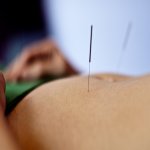In the short-term, pain relief from real acupuncture may not appear to be greater than pain relief from a placebo, but real acupuncture has different effects on the brain which could theoretically lead to more long-term benefits.
In a new study, 43 patients with knee osteoarthritis were given either real or sham acupuncture. In patients who expected the acupuncture to work, the sham acupuncture provided just as much pain relief as the real acupuncture, suggesting a strong placebo effect in these individuals.
During the study, however, subjects had brains scanned in an fMRI machine, and brain scans revealed that even though both groups of subjects were reporting similar amounts of pain relief, different areas of the brain were being activated in the real acupuncture group compared to the sham group. These brain regions could be implicated in the long-term production of chronic pain sensations and could suggest that over the long run, acupuncture could theoretically provide more than simply a placebo.
Conclusions
There is a large body of evidence that acupuncture is no more effective than a placebo, but studies like this call into question the value of previous acupuncture studies that failed to adequately test for the long-term effects of acupuncture on neural signs of central sensitization. In theory, needling could potentially have some real benefits when used in the proper context.
References
